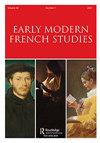Thought about action: ergon in Gargantua
IF 0.2
3区 历史学
Q2 HISTORY
引用次数: 0
Abstract
Rabelais’s fictional chronicles communicate thought about action, including about the relationship of action to social status. They explore and test the view, which was widespread in the period, that the actions you undertake in life should be determined by your social status. The notion that certain actions properly characterise different social groups because those groups have distinct functions in society is widely communicated by the term ergon in key ancient Greek texts which Rabelais knew in the original. So ergon provides a way into the wider question of Rabelais’s representation of, and relationship to, social hierarchy. That question, explored here in relation to a key sixteenth-century work, was opened up in relation to key seventeenth-century works by Michael Moriarty’s pioneering Taste and Ideology in Seventeenth-Century France (1988).关于行动的思考:在Gargantua的ergon
拉伯雷的虚构编年史传达了关于行动的思想,包括行动与社会地位的关系。他们探索和检验了当时广为流传的观点,即你在生活中所采取的行动应该由你的社会地位决定。某些行为恰当地描述了不同的社会群体,因为这些群体在社会中有不同的功能,这一概念通过“ergon”一词在重要的古希腊文献中得到广泛传播,拉伯雷在原文中就知道这个词。所以埃尔根为拉伯雷对社会等级的描述及其与社会等级的关系这一更广泛的问题提供了一条途径。这个问题,在这里探讨了与16世纪的一部重要作品有关的问题,在迈克尔·莫里亚蒂的开创性作品《17世纪法国的品味与意识形态》(1988)中与17世纪的重要作品有关。
本文章由计算机程序翻译,如有差异,请以英文原文为准。
求助全文
约1分钟内获得全文
求助全文
来源期刊

Early Modern French Studies
Multiple-
CiteScore
0.10
自引率
0.00%
发文量
14
期刊介绍:
Early Modern French Studies (formerly Seventeenth-Century French Studies) publishes high-quality, peer-reviewed, original articles in English and French on a broad range of literary, cultural, methodological, and theoretical topics relating to the study of early modern France. The journal has expanded its historical scope and now covers work on the sixteenth, seventeenth, and eighteenth centuries. Within this period of French literary and cultural history, the journal particularly welcomes work that relates to the term ''early modern'', as well as work that interrogates it. It continues to publish special issues devoted to particular topics (such as the highly successful 2014 special issue on the cultural history of fans) as well as individual submissions.
 求助内容:
求助内容: 应助结果提醒方式:
应助结果提醒方式:


